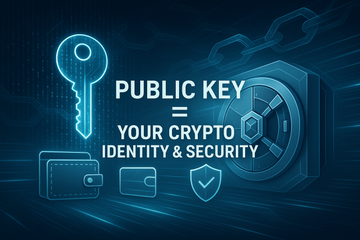In the world of cryptocurrency, there's an unsung hero that makes everything tick—it's the public key. Without this nifty piece of cryptographic technology, the whole system could come crashing down. But, what exactly is a public key, and why should you care? Let me walk you through the essentials.
A Peek Behind the Curtain: What is a Public Key?
Think of the public key as your digital identity card, only way more secure. I mean, we don't just hand out our Social Security numbers, right? It's the same with crypto; the public key lets you receive funds without exposing your sensitive information. It works alongside its sibling—the private key—to provide a seamless and secure transaction experience. How neat is that?
If you’re sending Bitcoin to a friend, your public key acts as the address. It's a string of letters and numbers, as unique as a snowflake but not as fragile, that helps ensure your transaction flies safely through the digital ether.
Two Keys, One Purpose
Imagine walking into a vault with two keys—you need both to open it. Cryptocurrency wallets function similarly. The public key encrypts data for confidentiality, while the private key decrypts it on your end. Most wallets, like Trezor or Ledger, operate using this tried and tested method.
Here's the magical part: your public key can be shared openly. It's like giving out your phone number. Nobody can just use it without your permission, but it's essential for anyone who wants to contact you.
Why Public Keys Matter More Than You Think
You know how, in movies, the right password gives you access to a secret world of information? Public keys are like that password, minus the Hollywood drama. Some folks might see them as mere strings of data, but they’re pivotal to keeping your crypto secure. Public keys legitimize transactions and shield against fraud—a tall task for a simple digital string.
Metrics, Consistency, and Public Perception
Let’s be real: reputation matters, especially when your wealth is concerned. A robust public key infrastructure can make or break public trust in cryptocurrencies. If public keys are weak, the potential for hacking increases, affecting confidence in the digital currency world.
You might be wondering, 'Aren't there issues with public keys?' Of course, there are. Just like any system, it’s not flawless. Quantum computing threatens to crack this security net open someday. While that might sound like a sci-fi plot, researchers are hard at work addressing this with new algorithms.
Surfing Through Key-Based Tech with Ease
The journey into cryptography doesn’t have to be all binary and code; it's a fascinating ride if you let it be! Public keys are part of daily online transactions, not just crypto. Every time you engage in secure communications—like emailing confidential documents—you’re benefitting from the exact science of public key cryptography. Who knew finance could meet James Bond-level tech?
Here's where things get even more interesting—smart contracts! These self-executing contracts, built on blockchain, rely on public keys to make sure contracts are fulfilled to the letter. The innovations are endless, folks!
A Quick Reality Check
Adopting cryptocurrency without understanding public keys is like driving a car without knowing what the brakes do. You might get somewhere, but the journey will be a dicey one. So, next time you think of investing or transacting, remember how much hinges on those humble keys.
Final Thoughts: Keys to the Kingdom
You can think of public keys as the gatekeepers of the crypto wonderland. While they seem simplistic, they're anything but. They offer security, utility, and a glimpse into how encrypted systems secure modern digital economies. Consider them more than numbers; they are guardians of your digital assets, just waiting to be appreciated.
So, whether you're a crypto novice or a seasoned hodler, knowing the ins and outs of public keys can only be an advantage. After all, knowledge is your most powerful asset, isn't it?











